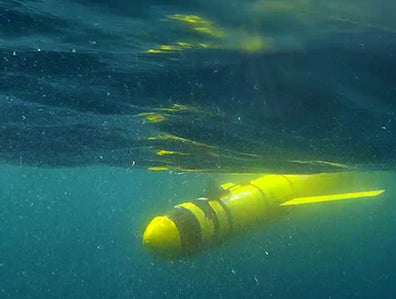‘Dead zone’ larger than Scotland found by underwater robots in Arabian sea
Scientists say situation is 'worse than feared' after finding almost no oxygen in Gulf of Oman

Your support helps us to tell the story
From reproductive rights to climate change to Big Tech, The Independent is on the ground when the story is developing. Whether it's investigating the financials of Elon Musk's pro-Trump PAC or producing our latest documentary, 'The A Word', which shines a light on the American women fighting for reproductive rights, we know how important it is to parse out the facts from the messaging.
At such a critical moment in US history, we need reporters on the ground. Your donation allows us to keep sending journalists to speak to both sides of the story.
The Independent is trusted by Americans across the entire political spectrum. And unlike many other quality news outlets, we choose not to lock Americans out of our reporting and analysis with paywalls. We believe quality journalism should be available to everyone, paid for by those who can afford it.
Your support makes all the difference.An underwater “dead zone” larger than the area of Scotland has been discovered by robots exploring the Arabian Sea.
Scientists say the situation is “worse than feared” after finding almost no oxygen in the Gulf of Oman, the strait that connects the Arabian Sea to the Strait of Hormuz in the Middle East.
The region, which is almost totally devoid of life, has been described as the “largest and thickest dead zone in the world” and a “disaster waiting to happen”.
Describing the dead zone as "vast and growing", lead researcher Dr Bastien Queste, from University of East Anglia’s School of Environmental Sciences, said: “The ocean is suffocating. Of course all fish, marine plants and other animals need oxygen, so they can't survive there.
“It's a real environmental problem, with dire consequences for humans too who rely on the oceans for food and employment.”
Dead zones also impact the chemical recycling of nitrogen, causing nitrous oxide, a greenhouse gas 300 times more potent than CO2, to be produced.

The team deployed two Seaglider robots in the Gulf for eight months in order to build an underwater picture of oxygen levels. The area was previously inaccessible to researchers due to piracy and geopolitical tensions.
Communicating by satellite, the gliders, which are the size of a small human diver, reached depths of up to 1,000 metres and covered an area spanning thousands of miles.
"They are a disaster waiting to happen - made worse by climate change, as warmer waters hold less oxygen, and by fertiliser and sewage running off the land into the seas,” Dr Queste said.
"The Arabian Sea is the largest and thickest dead zone in the world. But until now, no-one really knew how bad the situation was because piracy and conflicts in the area have made it too dangerous to collect data.
"We barely have any data collected for almost half a century because of how difficult it is to send ships there. Our research shows that the situation is actually worse than feared.”
Also known as “oxygen minimum zones”, dead zones can naturally occur between 200 and 800 metres deep in some parts of the world. But the team found fish in the Gulf of Oman were being “squeezed” into a thin layer near the surface of the water.
Computer simulations showed the problem is set to get worse, with further oxygen decreases and expanding dead zones expected over the next century.
The study is published in collaboration with Oman's Sultan Qaboos University in the Geophysical Research Letter.
Join our commenting forum
Join thought-provoking conversations, follow other Independent readers and see their replies
Comments